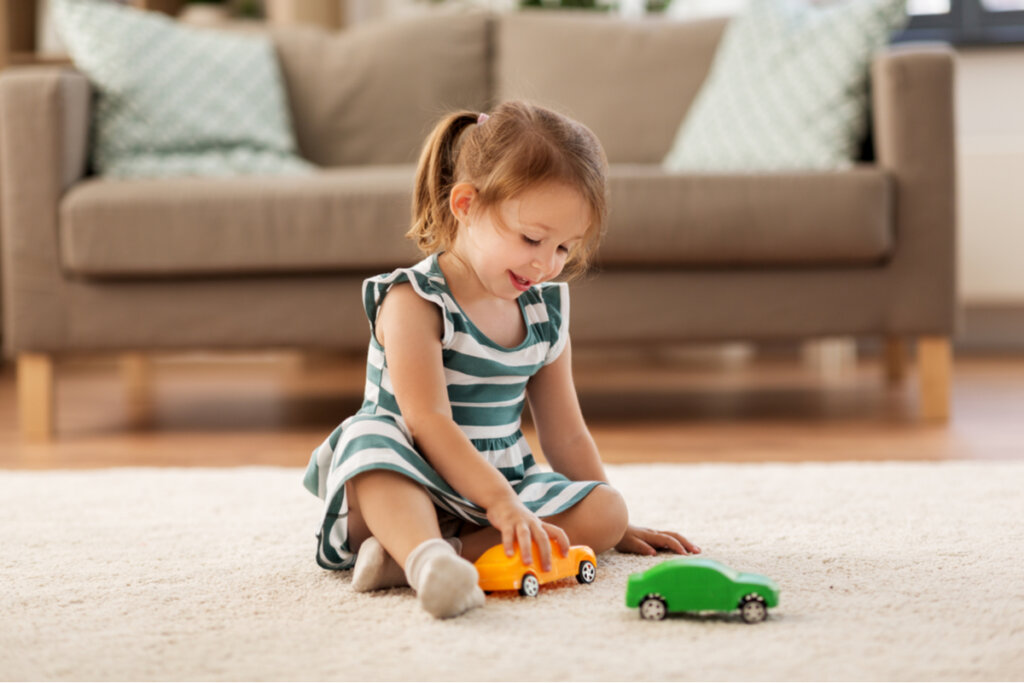Children With Greater Self-Control Become Happy Adults


Written and verified by the psychologist Valeria Sabater
Children with greater self-control aren’t only more mature little ones, but they’re also more likely to end up as happy adults. However, sometimes, we neglect the great relevance that developing impulse control has for the child’s mind. As a matter of fact, this complex ability relates to all areas of being human.
Self-control is a dimension that begins to develop from the first year of life up until the age of 26 – 30 years. In fact, the human prefrontal cortex doesn’t finish developing until we’re well into our twenties. This means that impulse regulation is possibly the slowest maturing area.
This has multiple connotations. For instance, if we don’t begin to educate children from an early age in this capability, when they reach adolescence they’ll experience serious behavioral and emotional regulation problems. Therefore, starting children off with correct self-control means investing in their quality of life.
“Personal health is related to self-control, and to the worship of life in all its natural beauty -self-control bringing with it happiness, renewed youth and long life.”
-Maria Montessori-

Why do children with greater self-control become happy adults?
Most of us have heard of the marshmallow experiment conducted at Stanford University in 1972. This research consisted of understanding children’s self-control through a simple test. Children were offered the choice between a small but immediate reward (a marshmallow) or two of them if they waited for a period of time.
At that time, it was said that social and economic origin regulated self-control more than willpower. However, in a new study, conducted in 2020 by several universities such as Harvard and Columbia (USA) this conclusion was disproved. In fact, we now know that impulse control forms part of the maturation process and development of the brain.
Early education and the role of parents to promote the regulation of impulse control are key. Social and economic origin doesn’t matter. What matters is the commitment to the education of our own children. For example, if we have a three-year-old child who hits others and to whom nothing is said, they’ll continue behaving in this way in primary and secondary school.
Indeed, if we don’t educate our children’s resistance to frustration, they’ll turn into angry (and unhappy) teenagers because they don’t get everything they want. That’s because the ability to manage impulses, emotions, and behavior forms the foundation of every child’s psychological well-being.
Impulse control slows down brain aging
A recent study was published in the journal PNAS. It was conducted by the universities of Michigan, Duke, the University of Oslo, and King’s College London, among others. The study revealed the following:
- Children with greater self-control become more satisfied adults with a better quality of life.
- Impulse control reduces age-related cognitive decline. In fact, 45-year-olds with this ability barely showed any signs of the classic onset of brain aging.
- The researchers associated this better brain health with lifestyle. It seems that self-control favors the power to make more thoughtful decisions. Furthermore, it impacts on work, financial and relational aspects of life. As a matter of fact, regulating behavior and emotions operates in all areas of life, such as affective relationships and problem-solving.
Self-control is an executive function. These are processes that aim to regulate behavior. This dimension shares the same brain region as empathy.

Children with greater self-control are more empathetic
We know that the same part of the brain that allows us to put ourselves in the shoes of others (empathize) also helps us regulate impulses. We also see this in children with greater self-control. Furthermore, when we educate them from an early age in this ability, they relate much better to their social environment.
In fact, they integrate in a more mature and happy way in their surroundings and with their peers. They can also put themselves in the place of others and contain their emotions, such as envy, anger, or frustration. These factors form pillars for good psychological health, problem-solving, reaching agreements, being respectful, promoting coexistence, etc.
“I count him braver who overcomes his desires than him who conquers his enemies; for the hardest victory is the victory over self.”
-Aristotle-
Last but not least, it should be borne in mind that self-control has nothing to do with intelligence or socioeconomic origin. This was highlighted in the study of 1972 conducted by Stanford University. It confirmed that children with greater self-control are the consequence of a committed education in this aspect. However, this variable must be worked on and regulated on a daily basis, even in adulthood.
All cited sources were thoroughly reviewed by our team to ensure their quality, reliability, currency, and validity. The bibliography of this article was considered reliable and of academic or scientific accuracy.
- Benjamin, D. J., Laibson, D., Mischel, W., Peake, P. K., Shoda, Y., Wellsjo, A. S., & Wilson, N. L. (2020). Predicting mid-life capital formation with pre-school delay of gratification and life-course measures of self-regulation. Journal of economic behavior & organization, 179, 743–756. https://doi.org/10.1016/j.jebo.2019.08.016
- Richmond-Rakerd LS, Caspi A, Ambler A, d’Arbeloff T, de Bruine M, Elliott M, Harrington H, Hogan S, Houts RM, Ireland D, Keenan R, Knodt AR, Melzer TR, Park S, Poulton R, Ramrakha S, Rasmussen LJH, Sack E, Schmidt AT, Sison ML, Wertz J, Hariri AR, Moffitt TE. Childhood self-control forecasts the pace of midlife aging and preparedness for old age. Proc Natl Acad Sci U S A. 2021 Jan 19;118(3):e2010211118. doi: 10.1073/pnas.2010211118. PMID: 33397808; PMCID: PMC7826388.
This text is provided for informational purposes only and does not replace consultation with a professional. If in doubt, consult your specialist.








